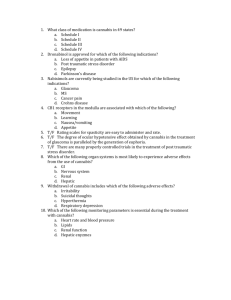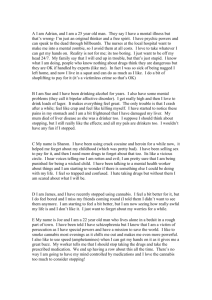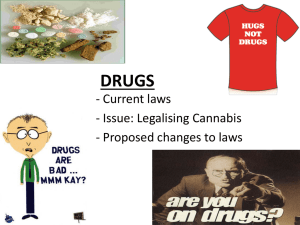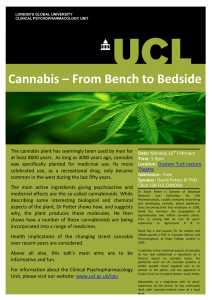Cannabis Marketplace: Ten Steps to a Billion-Dollar Market
advertisement
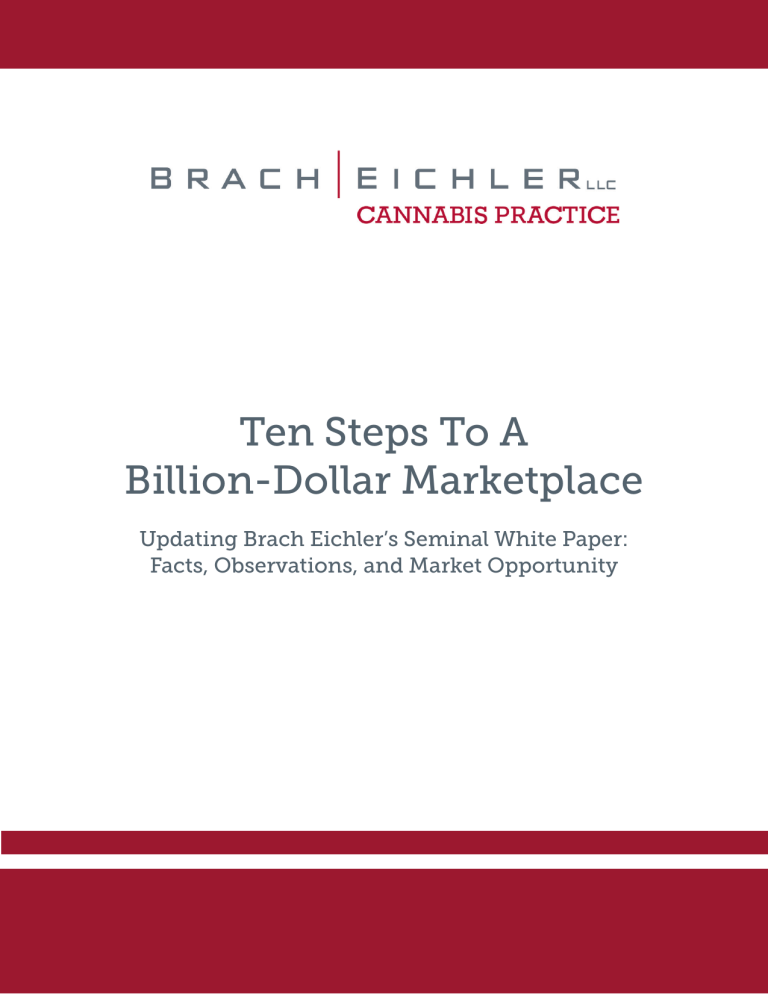
Ten Steps To A Billion-Dollar Marketplace Updating Brach Eichler’s Seminal White Paper: Facts, Observations, and Market Opportunity INTRODUCTION In December 2017, Roseland law firm Brach Eichler commenced the thought-leader dialogue around recreational cannabis regulation with its seminal White Paper: “The Business, Regulatory, and Legal Challenges–and Opportunity– of a Legalized Cannabis Marketplace in New Jersey.” In the intervening six months, Governor Murphy’s swearing in and the public anticipation of the creation of a new marketplace has driven the debate in at turns enlightening, disappointing, and unexpected directions. Here are ten reactions from Brach Eichler’s Cannabis Law Practice Co-Chairs John D. Fanburg and Charles X. Gormally. The Genius of Leveraging Medical. The Murphy Administration recognized early in their 100-day promise that a drastic and sorely needed expansion of the medical cannabis program pointed the way forward. By providing an initial budget with 10 times the tax revenue from the medical program–and Executive Order 6 to back it up–the Administration is signaling the legislature to get serious about cannabis or find itself out of the conversation. By expanding medical indications for patients, making it easier for physicians to participate, and easing regulatory restrictions for obtaining medical marijuana, Governor Murphy introduces a step toward the inevitable legalization similar to the process in Colorado and Washington and obviates influences from the legislature. 1. Shortsighted Local Politics. Some municipalities have staked out “not in my backyard” positions for cannabis businesses in their towns. These towns will find themselves on the sidelines of this market opportunity even while their resident populations will continue to access products now through the greatly expanded Medical Marijuana Program and the possible adoption of a statewide, regulated, adult-use marketplace. The sidelined municipalities— principally perceived as conservative outposts: Ocean County, the Route 17 corridor, and Morris/Hunterdon Counties—will ultimately not produce sufficient political pull to prevent the inevitable movement toward statewide legalization. 2. 3. Atlantic City Recognizes Potential Marketplace. The Brach Eichler White Paper noted the advantage that tourist destinations can capture in the cannabis marketplace. These tourism advantages in New Jersey have been acknowledged by local officials in both Asbury Park and Atlantic City where each outlined cannabis lounge aspirations that take best advantage of the recreational marketplace. 1 4. Is This the Best Way to Create a New Marketplace? The Brach Eichler White Paper 5. What’s Social Justice With No Economic Opportunity? One of the most cogent and strongly advocated for centralized functions in the industry, not just as regulatory tools, but as revenue generation areas for the State, which could pocket $1 billion. None of the dialogue from any corner–from the burgeoning industry trade groups to the Administration to the Legislature–has run with the concept of professionally commercializing the industry in advance. Instead, most legislative models favor cottage industry development, New Jersey resident bias, and encouragement of minority/woman-owned/veteran-owned business models. While striking a convenient political chord, these types of market incentives to create the marketplace need to remain focused on enhancing efficiencies and the tax revenue opportunity for the state while remaining mindful that the final price to the consumer at a lower level will assist in drying up the black market and criminal element for cannabis. progressive of the arguments against legalization is made by the loosely organized urban group, led by Senator Ron Rice, which decries the legalization plan as undermining local interests as capital flows in to cities whose residents will not participate in the economic upside of cannabis, but whose citizens will pay for additional law enforcement and social costs from already out-of-control drug consumption. Some suggest that the only needed change is to decriminalize the possession of cannabis, rather than to create a regulated marketplace for its production, distribution, and sale. While this might address the disproportionate impact that prohibition enforcement has upon minority communities, it will also expose those populations to a highly sophisticated and potentially violent black market, criminal supply chain that currently exploits these communities without consequences. Recent media coverage suggests that Administration assurances of assistance programs for entrepreneurs will overcome previous objections. Bank On It. Without introducing legislation, regulatory concepts, or a business plan, the Murphy Administration launched another potential winner when it outlined the role a state bank could play in the cannabis industry. The bank was always a part of the Administration’s economic development agenda, especially helpful to agricultural and small businesses, and utilizing it for cannabis made it more real in the eyes of public officials as well as cannabis advocates. Absence of reasonable banking services can hobble any newly created business and especially so with cannabis where federal illegality deprives the cannabis marketplace of banking access. A state-chartered bank can facilitate this access while profiting from participation in the new market. 6. 7. The Impaired Driving Canard. Opponents to recreational cannabis cite the law enforcement issue of a policy that promotes cannabis consumption while there is currently no test (similar to that for alcohol) to deter impaired driving. The argument is high profile and is being advanced through a dangerous combination of flawed logic and well-financed prohibition profiteers. Cannabis consumption is and will continue without regard to the creation of a regulated marketplace. At the same time, law enforcement has the tools necessary to address impaired driving regardless of the substance that is causing impairment. It is true that there is currently no roadside breathalyzer for cannabis impairment. However, New Jersey’s roadside sobriety tests, along with testimony from enforcement officers, regularly lead to convictions. Most importantly, the data suggests that in states that created an adult recreational marketplace for cannabis, DUI arrests did not materially change. No one can advocate for more impaired driving regardless of what causes impairment. A regulated, adult-use marketplace, where revenue derived from the market can be dedicated to educational efforts promoting responsible consumption, creates an enhanced opportunity, not a hazard. 8. Capital Accumulation Swarming to the Opportunity. Participation in the cannabis marketplace, whether it is medical or recreational, is not for the faint of heart and will require significant financial resources and risk tolerance. The absence of traditional banking investment has created an opportunity for the financial markets. The financial marketplace is responding to the call and private equity groups of all types and sizes are emerging to participate. Competition for state-issued licenses will be fierce and will reward those that are thoughtful and 2 prepared. Creative, progressive, local, and civic-minded groups of well-funded entrepreneurs who have recognized the opportunity will be the first success stories as the market matures in the years ahead. Schedule 1 Revisited. In November 2017 the New Jersey Appellate Division ordered that the state review and reconsider the Schedule 1 classification of cannabis. The Schedule 1 designation is a declaration that cannabis has no medical benefit and that the substance is capable of abuse. The designation has been in place since the inception of the “war on drugs” in the 1970s and creates a ‘Catch 22’ impediment to peer-reviewed serious research into cannabis. The NJ Department of Community Affairs conducted hearings on the subject over the past several months and received testimony from many witnesses attesting to the therapeutic, life-changing impact that cannabis can deliver. Watch for serious consideration of a change by the state as a further signal of its commitment to creating a robust marketplace for cannabis. 9. Path to Success. The complexity of the road ahead cannot be overstated. Succeeding in the cannabis marketplace will require a coordinated team of multidisciplinary specialists in law, accounting, finance, land use, local politics, compliance, cannabis-specific expertise, and public affairs input. The key is to identify the members of your development team that can deliver the required coordinated expertise that will position a license application for success while creating a business that will be financially sustainable. 10. CANNABIS LAW PRACTICE CO-CHAIRS John D. Fanburg Charles X. Gormally Managing Member; Co-Chair, Cannabis Law; Chair, Health Law Member; Chair, Litigation; Co-Chair, Cannabis Law 973.403.3107 jfanburg@bracheichler.com 973.403.3111 cgormally@bracheichler.com John D. Fanburg is the Managing Member of Brach Eichler LLC as well as Chair of the Health Law Practice and Co-Chair of the Cannabis Law Practice. John has more than 30 years of experience in health and hospital law, with an emphasis on corporate, transactional, and regulatory matters for physicians and health care institutions. A recognized leader in health law, John is known for excellence in transactions, perseverance in deal-making, and strength in corporate and regulatory matters. His broad experience representing major hospitals, diverse medical groups, and statewide physician specialty organizations provides him with in-depth knowledge of all aspects of the business practice of health care. He helps health care providers position themselves to deal with the constantly evolving medical marketplace, particularly health care reform. John is a thought leader in the discussion around legal cannabis in New Jersey and has been featured frequently in the press on the legislative and logistical obstacles and possibilities facing industry participants. For several years in a row, John has been ranked in Chambers USA and has been named to Best Lawyers and New Jersey Super Lawyers. In 2017, John was named to New Jersey Governor Phil Murphy’s Transition Team, serving as a member of the healthcare transition subcommittee. Charles X. Gormally is the Chair of the Litigation Practice and Co-Chair of the Cannabis Law Practice at Brach Eichler LLC. He is also a member of the firm’s Executive Committee. Over the past 40 years, Charles has developed a proficiency in counseling clients with complex business matters, challenges to governmental regulation, contract disputes, and tort actions. Designated as a Certified Civil Trial Attorney by the New Jersey Supreme Court for the past 20 years, a distinction reserved for less than 2% of attorneys, Charles has successfully tried jury and bench trial cases in the Federal and state courts, as well as arbitration matters. Charles is a state-certified mediator and has served as Chair of the Planning Board and two terms as Mayor of Mountain Lakes. A strong advocate for the creation of a regulated cannabis marketplace in New Jersey, Charles has been widely quoted in the press on the challenges and opportunities for potential industry participants and the current legislative landscape. Charles has been named a Best Lawyer by his peers for 2018, and is an instructor with the Institute of Continuing Education. ABOUT BRACH EICHLER’S CANNABIS LAW PRACTICE Brach Eichler, a full-service law firm based in Roseland, NJ, is uniquely situated to provide advice and guidance across a wide range of business groups that may be interested in diversifying into the emerging cannabusiness market opportunity. Over the past 50 years, the Firm’s practitioners have built trusted, personal relationships with their clients, rendering advice that is business-savvy and creative, yet practical. The firm’s attorneys are thought leaders in their industries, known for “getting the deal done” with their clients’ interests well represented and always top of mind. These qualities will be especially useful as New Jersey moves forward to develop a cannabis marketplace. This type of opportunity, while not for the faint of heart, will be advantaged by the strength of Brach Eichler’s resident health, corporate formation, regulatory, compliance, land use, employment, tax, and real estate capabilities. 101 Eisenhower Parkway, Roseland, NJ 07068 www.bracheichler.com | 973.228.5700 3
